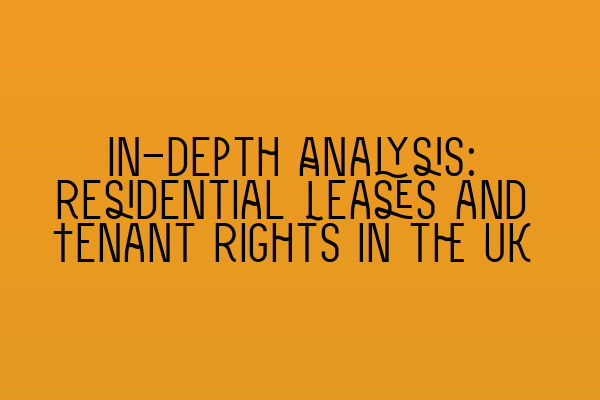Residential Leases and Tenant Rights in the UK: An In-depth Analysis
Introduction
Residential leases and tenant rights are crucial aspects of property law in the United Kingdom. Understanding the intricacies of residential leases is essential for both landlords and tenants to ensure their rights and obligations are protected. In this blog post, we will delve into the various aspects of residential leases, including their definition, types, legal requirements, and tenant rights.
Defining a Residential Lease
A residential lease, also known as a tenancy agreement, is a legally binding contract between a landlord and a tenant. It grants the tenant the right to occupy a residential property in exchange for paying rent. Residential leases lay down the terms and conditions that govern the relationship between the landlord and the tenant.
Types of Residential Leases
There are two main types of residential leases in the UK:
1. Assured Shorthold Tenancy (AST): This is the most common type of residential lease. An AST provides tenants with a minimum of six months’ tenancy, giving them the right to live in the property for the agreed period. ASTs offer landlords the flexibility to regain possession of their property after the fixed term, subject to giving proper notice to the tenant.
2. Regulated Tenancy: Regulated tenancies are primarily long-term tenancies that originated before the implementation of the Housing Act 1988. These tenancies offer tenants more security as they have the right to remain in the property indefinitely, so long as they comply with the terms of the lease.
Legal Requirements for Residential Leases
Residential leases in the UK must adhere to specific legal requirements. These include:
1. Duration: The lease must clearly state the duration of the tenancy, whether it is a fixed-term lease or a periodic tenancy.
2. Rent: The amount of rent, payment frequency, and any rent review provisions must be clearly specified in the lease.
3. Repairs and Maintenance: The lease should outline the responsibilities of both the landlord and tenant regarding repairs and maintenance of the property.
4. Deposit Protection: Landlords must comply with the tenancy deposit protection schemes and provide tenants with the necessary information within 30 days of receiving the deposit.
Tenant Rights in Residential Leases
Tenants have certain rights and protections under UK law. Some key tenant rights include:
1. Quiet Enjoyment: Tenants have the right to live in the property undisturbed and without interference from the landlord.
2. Repairs and Maintenance: Landlords are responsible for ensuring that the property is safe and free from hazards. They must make necessary repairs and maintain the property in a habitable condition.
3. Right to Notice: Landlords must provide proper notice before entering the property, except in the case of an emergency.
4. Eviction Protection: Tenants have protection against unlawful eviction and harassment. Landlords must follow the proper legal procedures if they wish to evict a tenant.
Conclusion
Residential leases and tenant rights are integral parts of property law in the UK. By understanding the definition, types, legal requirements, and tenant rights associated with residential leases, both landlords and tenants can ensure a smooth and legally compliant tenancy.
If you found this article informative, you may be interested in learning more about SQE exams and how to prepare for them. Check out our related articles:
– SQE 1 Practice Exam Questions
– SQE 1 Practice Mocks FLK1 FLK2
– SQE 2 Preparation Courses
– SQE 1 Preparation Courses
– SRA SQE Exam Dates
At SQE Property Law & Land Law, we provide expert legal services and guidance on property-related matters, including residential leases and tenant rights. Contact us today to speak with one of our experienced solicitors and ensure your property matters are handled professionally and efficiently.
